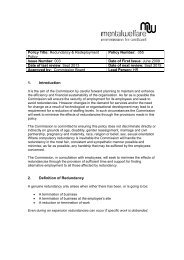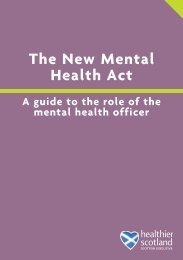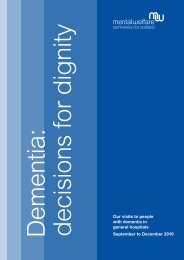designated medical practitioner (DMP) - Mental Welfare ...
designated medical practitioner (DMP) - Mental Welfare ...
designated medical practitioner (DMP) - Mental Welfare ...
- No tags were found...
Create successful ePaper yourself
Turn your PDF publications into a flip-book with our unique Google optimized e-Paper software.
The role of theDesignatedMedicalPractitioner
This booklet is for people who are having treatment under Part 16 of the<strong>Mental</strong> Health (Care and Treatment) (Scotland) Act 2003.It explains the following:• When you can be given treatment against your will• What safeguards there are to make sure your rights are protected• What Designated Medical Practitioners (<strong>DMP</strong>s) are• What they do• What happens if your doctor and the <strong>DMP</strong> disagree• What to do if you don’t like the <strong>DMP</strong>’s decision• What happens if the <strong>DMP</strong> agrees to a treatment you have refused in anadvance statementThe <strong>Mental</strong> <strong>Welfare</strong> Commission:Who we areHow to contact usIf you could like this leaflet in an easy read format, please call us on0800 389 68093
The <strong>Mental</strong> Health (Care and Treatment) (Scotland) Act 2003What is the <strong>Mental</strong> Health Act?The Scottish Parliament passed the <strong>Mental</strong> Health (Care and Treatment)(Scotland) Act 2003. This is sometimes referred to as the MHA or the Act.The Act came into effect in October 2005. It sets out how you can be treatedif you have a mental illness, a learning disability or other related conditions.This leaflet describes the law and explains what it says about:• when you can be given treatment against your will; and• what safeguards there are to make sure your rights are protected.Under the Act the psychiatrist in charge of your treatment is known as theResponsible Medical Officer (RMO).Can you be treated without your consent?Yes, but this is subject to regulations and safeguards.The law states that you can be given medication as treatment for mentaldisorder without your consent in the first two months of your treatment if it isin your best interests.After two months of medication, if you are able to consent and are willing to doso, your RMO will ask for your written consent and complete a T2 form.If you are not able to consent, or do not agree with the treatment, the RMOmust arrange for certain safeguards to be put in place including a secondopinion from a doctor who will complete a T3 form (if they agree).4
The law also states that some other treatments require that the safeguardsmust be in place from the start of the treatment. A T2 or T3 form has to becompleted before a treatment can start. This includes the following:• medication if the purpose is to reduce sex drive• artificial nutrition• electroconvulsive therapy (ECT)• some other treatments that act directly on the brainWhat are the safeguards?If your doctor wants to give you treatment without your consent he or shemust get an independent opinion from a Designated Medical Practitioner(<strong>DMP</strong> for short – we explain below what a <strong>DMP</strong> does).To do this your doctor will contact the <strong>Mental</strong> <strong>Welfare</strong> Commission (MWC).We will contact an independent <strong>DMP</strong> who will come to see you and make adecision about whether to go ahead with the treatment.If you would like more information about consent to treatment please readthe Scottish Government publication: The New <strong>Mental</strong> Health Act: A Guide toConsent to Treatment: Information for Service Users and their Carers.Who are Designated Medical Practitioners?<strong>DMP</strong>s are experienced psychiatrists. When you need the safeguard of a <strong>DMP</strong>your doctor will contact us and the MWC will ask a <strong>DMP</strong> to see you.The <strong>DMP</strong> who comes to see you will work for a different clinical team andhospital from the people who provide your treatment.The Commission gives <strong>DMP</strong>s special training to make sure that they fullyunderstand their duties under the <strong>Mental</strong> Health Act. If your treatment isparticularly specialised we will try ensure the <strong>DMP</strong> has specialist knowledge ofthis treatment.5
A <strong>DMP</strong>’s duties are set out in the Act and usually they do not work for theCommission. Sometimes we send one of our doctors to resolve a dispute or forhighly specialised treatments when no-one else is available.You have a right to access independent advocacy services. The advocacyworker can help you to express your views. If you need us to, the <strong>Mental</strong><strong>Welfare</strong> Commission will help you get information about people andorganisations that can do this for you.6
About <strong>DMP</strong>sWhat does the <strong>DMP</strong> do?Your own doctor will put forward a plan for treating you. The <strong>DMP</strong>’s role is todecide whether the treatment the doctor has put in this plan is in line with thelaw and is in your best interests.The <strong>DMP</strong> can only give an opinion on the specific <strong>medical</strong> treatment. The <strong>DMP</strong>cannot give a second opinion on your diagnosis or general treatment.If you want this type of second opinion, you must tell your own doctor who canarrange this.Alternatively, your solicitor may also arrange an independent <strong>medical</strong> opinionin relation to your compulsory treatment in general. Even if you have your ownsecond opinion the <strong>DMP</strong> assessment must still take place.Before making a decision, the <strong>DMP</strong> will:• talk to you and listen to your views about your treatment;• assess your mental state;• look at your case notes;• pay particular attention to an advance statement if you’ve made one (anadvance statement is a signed written statement about how you would andwould not like to be treated); and• consult others about your care (including your named person and thoseinvolved in your treatment), if it is practical to do so.If the <strong>DMP</strong> agrees with the treatment plan he/she will complete a T3 formand send it to the psychiatrist in charge of your care, known as the RMO(Responsible Medical Officer).7
More about the <strong>DMP</strong> roleThe <strong>Mental</strong> Health Act says that the <strong>DMP</strong> must also take into account:• your past and present wishes about your care and treatment;• the views of your named person and any carer, guardian or welfare attorneyyou have;• the range of options available for your care and treatment;• whether the care and treatment will be of maximum benefit for you;• your individual abilities and background; and• other important things about you, such as your age, gender, sexualorientation, religion, racial origin or membership of any ethnic group.The <strong>DMP</strong> should also make sure that:• you are given the information and help you need to participate in decisionsabout your care and treatment;• you are not treated any less favourably than anyone else because you arebeing treated under the Act; and• if you are under the age of 18 your welfare is given the highest priority.What if you don’t like the <strong>DMP</strong>’s decision?If you think that your views have not been listened to, you may need someoneto help you express your views.There are independent advocacy services that may be able to help you withthis. The staff involved in your care or the MWC can give you information abouthow to access this.It is important that you continue to discuss your treatment with your ownpsychiatrist, as you may be able to come to an agreement. You cannot appealagainst a <strong>DMP</strong>’s decision as such. You continue to have the right to appealto the Tribunal for the revocation of the MHA order which is authorising thetreatment.8
If you, or anyone else, have serious concerns about what a <strong>DMP</strong> has done, it isimportant that you let the MWC know about this. We can also give you generaladvice on your rights under the <strong>Mental</strong> Health Act.What happens if your doctor and the <strong>DMP</strong> disagree?The <strong>DMP</strong> is completely independent of the doctor who is treating you. The<strong>DMP</strong> will only agree to the treatment plan if he or she believes it is legal and inyour best interests.If the <strong>DMP</strong> has ideas about how your treatment plan could be improved, orthey disagree with your own psychiatrist about the treatment plan, they willhave a further discussion and this might lead to the treatment plan beingchanged.If they cannot agree, another <strong>DMP</strong> or a doctor who works for the MWC willcome to visit you and try to resolve the problem.When a treatment plan has been approved a T3 form is issued. This is theauthority for you to be given the treatment.What if the <strong>DMP</strong> agrees to a treatment that you have refused in anadvance statement?We pay special attention to cases where the <strong>DMP</strong> agrees to treatment that isnot in line with your advance statement.Advance statements are an important part of the Act. Nobody should give youtreatment that conflicts with your advance statement without thinking verycarefully about your best interests.If you’ve made an advance statement it’s important that a copy of this is keptwith your <strong>medical</strong> records so that the <strong>DMP</strong> can read it and take your views intoaccount.If the <strong>DMP</strong> agrees to treatment that is not in line with your advance statement,he or she will provide you with information, in writing, explaining his or herdecision.9
The <strong>DMP</strong> must also send this information to the MWC and to your namedperson. We also advise the <strong>DMP</strong> to send a copy of the decision to yourpsychiatrist (RMO).If we are not satisfied with the explanation, or are not sure a treatment is inyour best interests, we will look into your case.If you would like more information about advance statements please readthe Scottish Government publication: The New <strong>Mental</strong> Health Act: A Guide toAdvance Statements.10
More about the MWCOur aimWe aim to ensure that care, treatment and support are lawful and respectthe rights and promote the welfare of individuals with mental illness, learningdisability and related conditions. We do this by empowering individuals andtheir carers and guiding and challenging service providers and policymakers.Why we do thisIndividuals may be vulnerable because they are less able to safeguard theirown interests. They can have restrictions placed on them in order to receivecare and treatment. When this happens, we make sure it is legal and ethical.Who we areWe are an independent organisation set up by Parliament with a range ofduties under mental health and incapacity law. We draw on our experience ashealth and social care staff, service users and carers.Our valuesIndividuals with mental illness, learning disability and related conditions havethe same respect for their equality and human rights as all other citizens. Theyhave the right to:• be treated with dignity and respect;• ethical and lawful treatment and to live free from abuse, neglect ordiscrimination;• care and treatment that best suit their needs; and• recover and lead as fulfilling a life as possible.12
What we doMuch of our work is at the complex interface between the individual’s rights,the law and ethics and the care the person is receiving. We work across thecontinuum of health and social care.• We find out whether individual care and treatment is in line with the lawand good practice• We challenge service providers to deliver best practice in mental health andlearning disability care• We follow up on individual cases where we have concerns and mayinvestigate further• We provide information, advice and guidance to individuals, carers andservice providers• We have a strong and influential voice in service policy and development• We promote best practice in applying mental health and incapacity law toindividuals’ care and treatment13
How to contact the commissionIf you have any questions about this topic, or would like information in anotherlanguage or format, please get in touch with us.Our contact details are:<strong>Mental</strong> <strong>Welfare</strong> Commission for ScotlandThistle House91 Haymarket TerraceEdinburghEH12 5HEService user and carer freephone:0800 389 6809Office: 0131 313 8777www.mwcscot.org.ukYour viewsWe want to know what you think about our service. If we’ve done somethingwrong we’d like to have the chance to try to put it right.Of course we’d also like to hear when we’ve managed to help. So if you have acomplaint, a comment or a compliment, please ring us on 0800 389 6809.We will listen to what you have to say and use it to help us improve our servicein future.14
If you would like to receive e-mail updates or information bypost please join our mailing list.NameAddress___________________________________________________________________________________________________________________________________________________________________________________________________________________________________________________E-mail_________________________________________________________________________________I am mostly interested in information for:q Learning disability service users or carersq <strong>Mental</strong> health service users or carersq <strong>Mental</strong> health professionalsjob title __________________________________________________________________________________q Learning disability professionalsjob title __________________________________________________________________________________q Otherplease specify__________________________________________________________________________q I would like my information in another format(for example, easy-read, tape, another language)16please specify__________________________________________________________________________I agree to join the <strong>Mental</strong> <strong>Welfare</strong> Commission mailing list.Please sign _________________________________________________________________________________We will store the information you provide on this form on a database. We willnot share your details with anyone else. By filling in and returning this form, weunderstand that you agree to this. We will only send you direct mail if you haveconsented to join our mailing list.
MWC: Who we are and what we doVisiting peopleMonitoring your care and treatment<strong>Welfare</strong> GuardianshipDetails of the full range of MWC publications are available from our websitewww.mwcscot.org.ukSecond edition January 201317
Thistle House91 Haymarket TerraceEdinburghEH12 5HETel: 0131 313 8777Fax: 0131 313 8778Service user and carer freephone:0800 389 6809enquiries@mwcscot.org.ukwww.mwcscot.org.ukJune 2006 revised January 2013APS Group 254645 (03/13)
















